John Gamber made his way to the Watergarden as a seasonal worker, hardly expecting the bathhouse to become an inextricable part of his life’s work.
It was 1978, a year after the San Jose resort’s founding by investors John Snell, Jay Rubenstein, Alex Mendizabel and Bob Farrar and entrepreneur Sal Accardi—who made Watergarden known as a place where men could meet and come on to other men free of intimidation. It was nine summers after the Stonewall riots ignited a global gay liberation movement.
It was also the year San Francisco’s Pride parade drew a staggering 375,000 attendees and an appearance by newly elected Supervisor Harvey Milk, who delivered a version of his famous “Hope Speech,” urging his “gay brothers and sisters” to “come out,” to live authentically and to “tell the truths about gays.”
“I remember hearing those words and thinking how the world seemed so full of possibility,” Gamber recalls, “and how we were making these communities for ourselves in places like the Watergarden, which really became a haven for us.”
Especially in the trying times to follow.
Gamber’s first foray into the Watergarden came as the nation enjoyed its gay bathhouse heyday—estimates put the number at about 200 in the U.S.—and, up to that point, historic visibility for members of the LGBTQ community. But 1978 also saw ramped-up backlash to the fight for equal rights from organizations such as Save Our Children and celebrities such as Anita Bryant. The year would end with Milk’s assassination.
Then came a harrowing AIDS crisis that ravaged gay populations in the Bay Area and beyond, prompting San Francisco to regulate men’s health clubs out of existence in attempts to control the spread of HIV.
Watergarden managed to survive, thanks in part to Gamber’s knack for realizing Accardi’s vision of making it “clean, pleasant, friendly, aesthetically pleasing,” yet discreet enough to evade unwanted attention.
But key to the resort’s resilience was Accardi’s political acumen, says Ken Yeager, who met him in the mid-1980s before becoming Santa Clara County’s first openly gay elected official. Accardi ingratiated himself with local politicos—former mayors Janet Gray Hayes and Susan Hammer, among others—enough that they helped protect the establishment.
“Sal was quite flamboyant, never apologetic about his own life or about the Watergarden, and ever a showman,” Yeager says in a phone call Monday. “He was always politically active and wanted local leaders to know what the Watergarden was, as opposed to them having preconceived notions about it.”
While San Francisco totally eliminated such establishments in 1984, the Watergarden survived by joining the fight against AIDS.
As health officials in so many major American cities shuttered gay bathhouses in a crackdown on unprotected sex, Accardi leveraged the Watergarden’s unique position to promote safe intercourse while maintaining its reputation as a place for self-discovery.
“Sal was able to maneuver around those waters and keep it open,” Yeager says. “He was good at that, running a very sophisticated operation that people respected.”
Because for Accardi, as for so many activists of his era, there was no gay liberation without sexual liberation. To drive that point home, he installed a plaque over the spa’s entrance that reads: “Wherever and whenever a minority is treated as second-class citizens, the entire community suffers. … Let justice outweigh prejudice.”
The Watergarden survived not only the disease but the hate it fueled against the gay community. Gamber says he remembers a time when patrons had to fear harassment on their way to the facility—one time from a man armed with a baseball bat.
It outlived Accardi, who succumbed to AIDS in 1994. It survived the digital revolution, which brought hookup apps that rendered physical meet-ups such as the Watergarden less vital to a younger generation of gay men.
Gamber, who’s now 59, says he’s unsure the Watergarden can survive Covid-19, with its attendant bans on large gatherings. “I mean, what do I have to work with now?” he wonders. “I think this is the end of it.”
What emerged amid early AIDS outbreaks as a safe-sex champion has succumbed to another pandemic entirely.
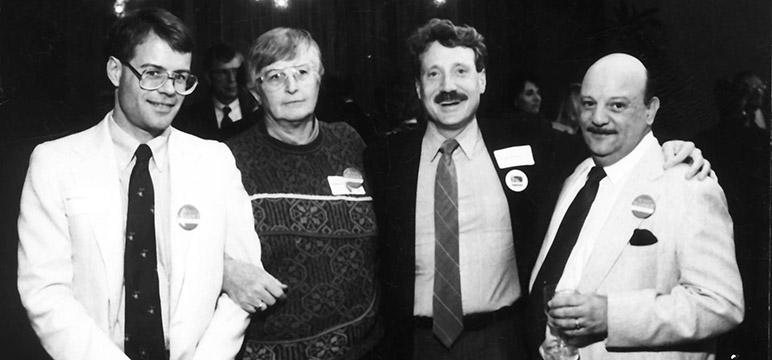
Ken Yeager, Wiggsy Sivertsen, Paul Wysocki and Sal Accardi (from left). (Photo by Ted Sahl, via SJSU)
Coronavirus Casualty
The Watergarden—an iconic San Jose institution and one of only two remaining gay bathhouses in the Bay Area—is closing for good, another casualty of coronavirus-related regulations to limit contact.
As first reported by the LGBTQ-focused Bay Area Reporter earlier this month, the closure marks a huge loss for South Bay public health officials. For decades, the business has worked hand-in-hand with the county to offer STD prevention services for men who frequented the poolside spa at 1010 The Alameda to have sex with other men.
“It is with deepest regret that we must announce our permanent closure due to the COVID-19 pandemic,” reads a statement recently posted on the Watergarden website. “Due to the ongoing closures of businesses, and unknown dates for a possible return to normal, we are not able to reopen. Already, being closed for months on end has resulted in grave financial losses.”
The note, which was also emailed to members, thanked patrons for their years of loyalty and “being part of the Watergarden family.”
During a recent sit-down interview at the Billy DeFrank LGBTQ Center, which lies just a quick walk away from the Watergarden, Gamber says he saw closure as an inevitability as soon as the county issued its first stay-home order on March 13.
“I remember thinking, as all the employees filed out the door, ‘How am I going to do this?’” he says. “It’s been painful. Very painful.”
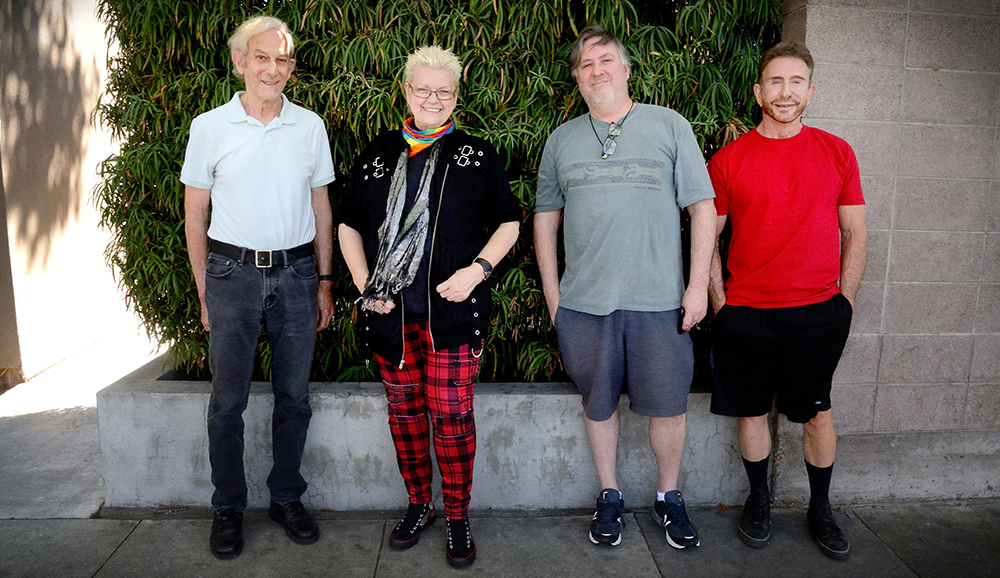
(From left) Jay Rubenstein, Gabrielle Antolovich, John Gamber and Jon Snell. Rubenstein and Snell co-founded Watergarden in 1977, along with Bob Farrar and Sal Accardi; Gamber came along a year later. Antolovich began working there doing public health outreach in the 1990s—the first woman to work with the resort. (Photo by Greg Ramar)
More Than Sex
Billy DeFrank board president Gabrielle Antolovich, 70, says the closure means San Jose will lose a cultural treasure, the capstone of a district—St. Leo’s—that’s long been considered the “gayborhood.” “It’s a loss to me, personally, as well,” she says, “because it played such an important role in my life.”
Antolovich began working at the Watergarden in the mid-’90s as one of the county’s public health outreach workers assigned to work with the LGBTQ community. “I was the first woman who did any work at the Watergarden,” she recalls, “and a lot of people were really against it at first, thinking that having a female do this was all wrong. But Gamber battled those sentiments until patrons started seeing it the way he did: that I was actually a good fit, that I was part of the team.”
Slowly, surely, the men got over it, Antolovich says, and she became a respected fixture at the men’s health club.
“It was wonderful working in such a beautiful environment,” she says, “and in one of those really rare sex-positive places in a city that’s not really sex positve. But this was a place where you could explore your sexuality—and that didn’t always mean having sex.”
In addition to the private rooms where patrons could hook up, the Watergarden featured a gym, a pool table, a swimming deck, hot tubs and lounge areas. Members would enjoy family-style gatherings on the back deck. They watched sports together.
“There was so much more going on than just sex,” Antolovich says. “To me, sex was a minor part of everything that happened there, but the Watergarden was honest about the fact that sex took place there, which is what attracted a lot of outside attention, even though there’s probably more sex that happens at any old hotel.”
For the most part, the Watergarden was a place for people to let their guard down. “It was a place where you get to be who you are, get to hang out with your friends, get to take for granted that people knew your orientation,” she says. “It was a place where you could be human, which is a safety and a feeling that heterosexuals enjoy all the time. There was no pressure to hook up. If you did, then that’s great, but there was plenty else to do.”
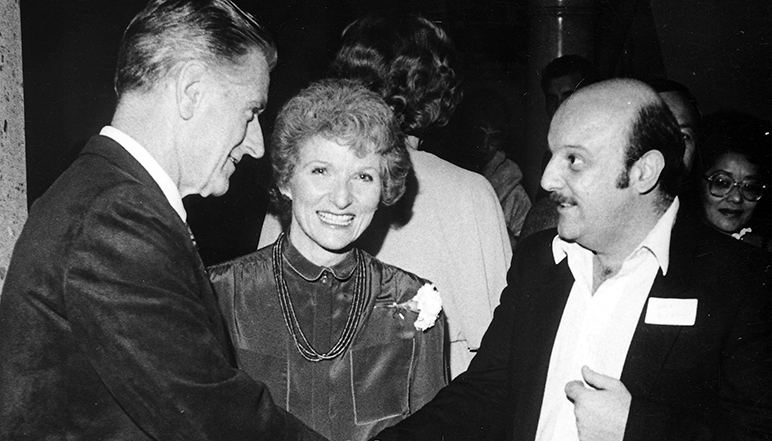
Then-Mayor Janet Gray Hayes (center) and Sal Accardi (right). (Photo by Ted Sahl, via SJSU)
The Endgame
One of the Watergarden’s more notable patrons during the AIDS pandemic happens to play a key role in the current one. Dr. Marty Fenstersheib, who now leads Covid-19 testing efforts for the Santa Clara County Department of Public Health, spent the better part of the ’80s developing the agency’s then-revolutionary AIDS-treatment program, which merged medical care with education to curb the spread of the virus.
“He was out, proud and frequented the Watergarden,” Antolovich says, “which signaled to others that this was a safe place to be.”
Dr. Fenstersheib’s approach to fighting AIDS, which involved opening a clinic and providing social supports to the queer community, was profiled in the Journal of the American Medical Association and became a treatment model for the rest of the nation. In a 2018 report by Yeager on the county’s response to the AIDS crisis, he notes how Dr. Fenstersheib’s reputation as a “hands-on clinician” helped him rise through the ranks to become the county’s chief public health officer, a role in which he created the outreach position that Antolovich would go on to work in the ’90s.
The AIDS epidemic “had a profound impact on Fenstersheib personally,” Yeager wrote in his 2018 history on the subject. His partner was diagnosed HIV positive in 1984 and died from the disease in 1992. As a member of the Gay Men’s Chorus, Fenstersheib mourned the deaths of 300 of its members from AIDS.
As a gay man and public health official, however, Dr. Fenstersheib saw the Watergarden as an important resource in the battle against AIDS. While his counterpart in San Francisco, Dr. Mervyn Silverman, moved to regulate bathhouses out of existence, the Watergarden remained open as usual—day and night, around the clock.
“Having his support meant a lot to us,” Gamber says. “Especially during that time.”
Alas, he says, there’s no saving the Watergarden from the economic toll of the present pandemic. “I just don’t see how that would happen,” Gamber says. “It’s been five months now since the order to close, and I don’t think we can go much longer.”
Snell—who once owned gay watering holes Desperados and Club St. John before handing the latter off to owners who reopened the place as Hamburger Mary’s—tapped real estate broker Mark Ritchie to help sell the 20,000-square-foot lot that never once closed in its 43 years until the Covid-19 shutdown began this past spring.
“I’m sad for them, for their business—they were such good citizens,” Ritchie says. “But I’m honored to help them see if someone wants to lease it or buy it.”
Despite the pandemic-related slowdown, he says he’s hopeful he could find a good buyer for the unique property, which was built in 1961 to house a California Board of Equalization office.
“There’s nothing like it in terms of the amenities—it’s really beautiful,” Ritchie says. “And the location is spectacular, with everything around it, from the Google campus that’s still underway to the [SAP] Arena, Whole Foods. It’s a great place.”
A sales ad, which debuts today, boasts of the property as a “one-of-a-kind owner-user, investment or development site.”
It declares the facility “a hidden gem on a prime strip of The Alameda.”
Absent from the listing is a price, because Ritchie says he’s “being blind to the value.”
“The Alameda has a history of a wide range of value per square foot,” he explains. “It’s a beauty-in-the-eye-of-the-beholder kind of area. So I’m keeping that open.”
Perhaps there’s some wealthy former patron who could step in to save it, Ritchie suggests. The Watergarden certainly made enough of an impact on enough lives to merit that kind of interest.
“We really did become like family,” Gamber reflects. “Since I posted that notice about closing, I’ve been bombarded with phone calls—a lot of them from people saying they met their lifelong partners at the Watergarden.”
One such caller used to mark his anniversary by enjoying the same spot on the pool deck where he met his partner—now deceased—decades prior. He was heartbroken to find out that the tradition would have to end.
“No one’s allowed inside,” Gamber says. “I had to tell him, ‘I’m sorry.’”
Just as Accardi struck out trying to secure loans to get the Watergarden going in the ’70s by virtue of what it was, Gamber has been unable to secure any federal coronavirus relief.
“The banks aren’t too keen on what we represent,” Gamber says. “We’ve always had to rely on private investment.”
Without any available for the time being, he says he’s accepted “the endgame.”
“I put in my time,” Gamber says. “I’m just hoping that this stirs some younger people to think about starting their own LGBTQ business in San Jose, to think about what they can bring to our community. As for me, for the Watergarden, I think we’ve had a good run.”
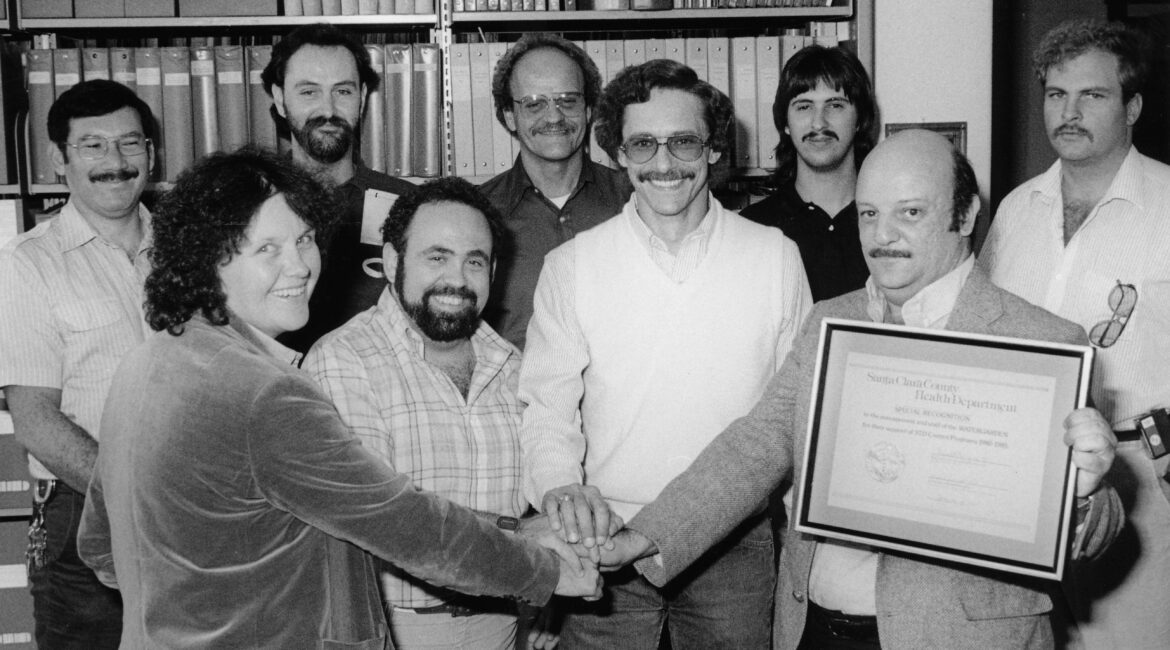
Dr. Bernadette DeArmond, director of the Santa Clara County AIDS program, presents to the Watergarden staff a certificate of recognition for their work in preventing sexually transmitted diseases. Sal Accardi holds the framed certificate that reads, “Santa Clara County Health Department, Special Recognition, to the management and staff of the Watergarden for their support of STD Control Programs 1980-1985.” (Photo by Ted Sahl, via SJSU)

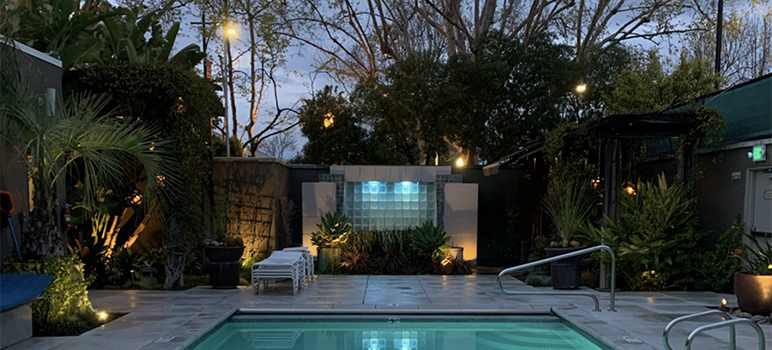
fundraising stunt…
and yet, landlords paying their tenant’s rent up and down the state
I’d always heard the plaque at the entrance read:
“The ends constitute the means of our business model.”
I had know idea that San Jose even had a place like this until now. Everyone always talks about SF and their history. I learned something knew. Bathhouses survived because they had entertainment and a sense of community and also rent wasn’t so high. I think it’s going to take some time for bathhouses to be open and safe again so that my friends have somewhere to go. Good article
SJK: For which they’ll get no more than a temporary “Thanks.” If even that.
And the state is taking another stab at Prop. 13: They want us to “Only raise taxes on businesses.”
What they don’t say: apartments are a business, and tenants will get whacked if We The People raise property taxes on businesses.
But landlords don’t pay the taxes — they collect taxes. For the electeds. Free of charge.
Tenants would pay for any rise in property taxes, so they should vote against whittling down Prop. 13.
But the best argument against and diddling with Prop 13 is that governments (federal, state, and local) already confiscate ≈50% of the average worker’s income.
HALF!! Wednesday Thursday Friday?!? And now they “need” more??
Why? To buy more special interest votes? To give state drones a fatter retirement income? Most of them are already getting a months-long free vacation, probably until November 3rd or thereabouts — unlike most of us.
This November, will We The People do something right, for once?
Or do they have the voting public so figured out that they can convince 50%+1 of voters to say,
“Yessir! Yessir! Thee bags full, Sir! Please, take even more of our taxable income …Sir.”
I have been singing that tune for a while. Split rolls help the owner occupied and hurt the tenants, all LL will just raise rent in kind. But its hard for people to get past their hate, so they think //punishing// landlords is what they are doing.
Rent Control only made rents go up faster.
Causa Justa only made evictions go from 500 a year to 10000.
The moratorium has only enabled tenants to go into debt, which they will unl8kely pay.
And split roll Prop 13 will be paid by tenants.
Do you guys get the picture yet?
The big threat is the practical elimination of Prop 13. A split roll tax would be a big step in that direction.
Most homeowners still don’t understand that every step that weakens Prop 13 makes it that much easier to take the next step — and pretty soon we’re marching toward NY & NJ ad valorem property taxes ≈5% — of what the gov’t tells them their house is worth.
What they don’t lose money to pay those higher taxes will be lost when their home equity takes a ginormous hit, because who’s gonna pay $1.5 mil for a property that saddles the buyer with an additional 5% annual loss?
What will our state get for passing that tax increase? And cui bono…? Not us chickens!
That question needs to be asked whenever this property tax takeaway is discussed. And when the drone du jour who’s promoting it explains why we’ve just gotta have a new program or whatever, follow up with “Do you mean there’s no place to cut spending?!”
This state spends more than $200 BILLION — every year! Gimme a red pencil and I’ll show them $20 billion in cuts that won’t make any noticeable difference to the public, only to the pigs with both front feet in the trough, sucking it up.
We will vote NO on any and all tax increases without blinking an eye.
Business aid to big businesses when named some of them return the funds. To which second one was to be set locally was the water garden not granted any aid as not only is it a business but it’s a community outreach in health and historic development! It’s a bit heart breaking that a business that gave back in their business is closing as it made it through one pandemic to close in the current one.
The Left eats their own, and they don’t care.
It was on its way out even before covid. covid just put the nails on the coffin.
Gay bathhouses are dying all around the world with the advent of smart phone apps.
Nice Blog THANKS FOR SHARING. I think it’s going to take some time for bathhouses to be open and safe again so that my friends have somewhere to go. Great Blog
I would buy it if I had the bucks. Some day the pandemic will be behind us — just keep it dark until then.
It’s a beautiful club, however, I don’t have the bucks and I dread to think about the politics involved in reopening and keeping it open.
I believe different types of therapy can in many respects be developed. A quarantine is present and a therapist must be searched online. Because people could be nuts for months if you stay at home. So I recommend looking and seeing calmerry.com . The therapists have been helping me make a video call which I thank. Just look and get acquainted. I hope that you’re good, too. Good luck and prosperity for everyone now
I’m just uneducated formerly poor white trash, but I met my rich husband with a PhD. at the Watergarden 25 years ago, so now I’m white trash with 10 million dollars. I don’t think I’ll buy it though for the 5 or so million offered, because I can just go the Steamworks in Berkeley for 30 bucks. And I really hate working, especially now that I really don’t have too.
I loved the music they played :)
Unfortunately, I was not lucky and after a lot of stress, I began to experience fears. This problem developed rapidly and I stopped living normally. However, I recently found a site https://westcoastsupply.cc/product/rockstar-tuna/ with a natural product to treat anxiety and phobias. You know, it really gave me significant relief and I continue this therapy.
grear music!!!
This comment is on an article posted in 2020.